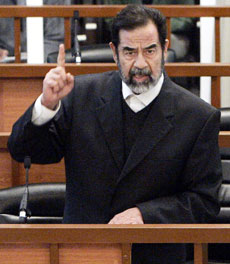BAGHDAD, Iraq - Saddam Hussein accused Iraq's Shiite-led Interior Ministry of
killing and torturing "thousands" of people as he appeared in court Wednesday
for questioning by judges and prosecutors in his trial for the killings of
Shiites in the 1980s.

Former Iraqi president
Saddam Hussein argues during his trial in Baghdad's Green Zone April 5,
2006. Hussein lashed out at Iraq's Interior Ministry just after his trial
resumed on Wednesday, accusing it of killing thousands of Iraqis.
[Reuters] |
Saddam, who will be cross-examined for
the first time in his six-month-old trial, was the sole defendant in the
courtroom as Wednesday's session opened. His seven co-defendants testified one
by one in earlier sessions over their role in a crackdown against Shiites in the
town of Dujail launched in 1982.
The new session came a day after prosecutors indicted Saddam on separate
charges of genocide, accusing him of trying to exterminate Kurds in a 1980s
campaign that killed an estimated 100,000 people. The charges will be dealt with
in a separate trial.
Saddam had been due to testify and be questioned in the last session of the
Dujail trial, on March 15.
But he launched into a long speech calling on Iraqis to stop sectarian
violence and unite to fight American troops. After demanding that Saddam stop
making political speeches, Chief Judge Raouf Abdel-Rahman closed most of the
session to the public to allow Saddam to finish talking.
In court Wednesday, Saddam demanded an international body examine signatures
alleged to be his on documents the prosecution has presented concerning the
crackdown, including an order approving the death sentences. Some of Saddam's
co-defendants have insisted that signatures said to be theirs are forged.
"You should resort to an impartial, international body" and not a body "that
kills thousands people on the streets and tortures them ... the Interior
Ministry," Saddam told Abdel-Rahman, referring to the now-Shiite-controlled
ministry, which some Iraqis accuse of backing Shiite militias that have
assassinated Sunni Arabs.
"Don't venture into political matters," Abdel-Rahman replied.
"If you are scared of the Interior minister, he doesn't scare my dog," Saddam
retorted.
Iraq has seen a wave of killings and attacks among Shiites and Sunnis since
the Feb. 22 bombing of a Shiite shrine in the city of Samarra.
Wednesday's cross-examination was the first opportunity in the six-month-old
trial for judges and prosecutors to directly question Saddam over allegations he
directed the crackdown against Dujail residents in which 140 Shiites were killed
and hundreds were imprisoned, some of them undergoing torture.
Saddam has acknowledged ordering the trial in which the Shiites were
sentenced to death but has maintained his actions were legal because they were
in response to a 1982 assassination attempt against him in the town. Saddam and
the seven former members of his regime face possible execution by hanging if
they are convicted.
Tuesday's indictment paves the way for a second trial of Saddam in which he
would likely face the death sentence if convicted, though prosecutors have not
yet said what sentence they will seek.
He and six other former regime members will be tried for Operation Anfal, the
1988 military campaign launched in the final months of the war with Iran to
crush independence-minded Kurdish militias and clear Kurds from the sensitive
Iranian border area of northern Iraq.
A memo released by the tribunal Tuesday said the Anfal campaign included
"savage military attacks on civilians," including "the use of mustard gas and
nerve agents ... to kill and maim rural villagers and to drive them out of their
homes."
"These people were subjected to forced displacement and illegal detention
involving thousands of civilians," court spokesman Raid Juhi said. "They were
placed in different detention centers. The villages were destroyed and burned.
Homes and houses of worshippers and buildings of civilians were leveled without
reason or a military requirement."
Operations against the Kurds included the March 1988 gas attack on the
village of Halabja in which 5,000 people, including women and children, died.
However, Juhi told The Associated Press that the Halabja attack would be
prosecuted separately and was not considered part of the charges filed Tuesday.
Others accused in the Anfal case include Saddam's cousin, Ali Hassan Majid,
or "Chemical Ali"; former Defense Minister Sultan Hashim Ahmad; former
intelligence chief Saber Abdul Aziz al-Douri; former Republican Guard commander
Hussein al-Tikriti; former Nineveh provincial Gov. Taher Tafwiq al-Ani; and
former top military commander Farhan Mutlaq al-Jubouri.